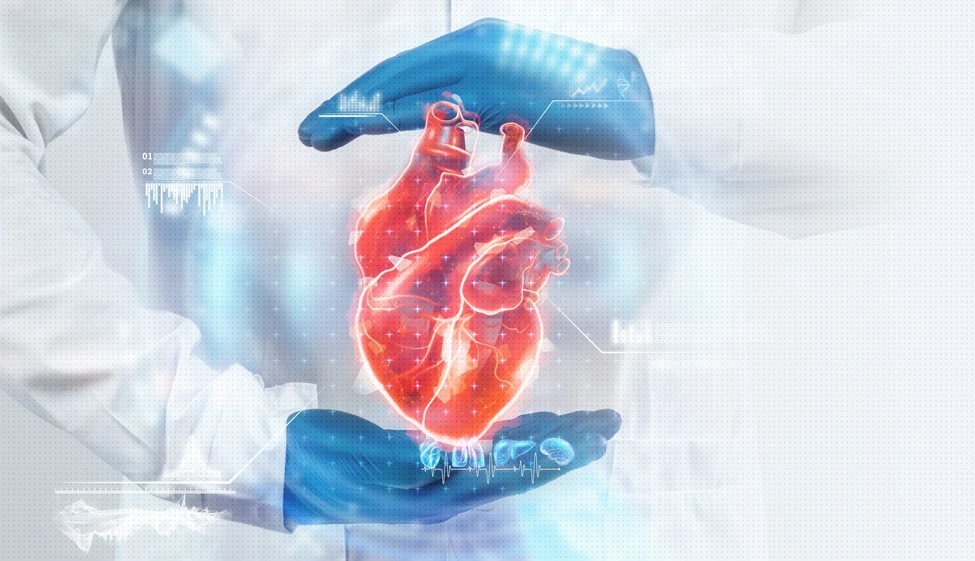
Work up of Heart Failure

Pre-Transplant Management

Heart Failure Team

Transplant ICU

Personalized Follow-up

Individualized Physiotherapy
Cardiomyopathy
A progressive Heart muscle disease causes weakening over time, leading to difficulty pumping blood and eventual heart failure.
Coronary Artery Disease
Caused by narrowing or blockage of the Coronary arteries due to fatty deposits.
Heart-Valve Disease
At times, malfunctioning Heart valves disrupt the flow of blood to and from the Heart.
Congenital Heart Defect
A congenital condition affecting the Heart's structures, detectable at birth or later in life, involving the heart's walls, valves, arteries, or veins.
Ventricular Arrhythmia
Ventricular Arrhythmias lead to rapid heartbeats originating from the heart's lower chambers, impeding effective blood circulation throughout the body.

A Heart Transplant is essentially the last resort treatment for heart failure. Though it is a complex procedure, the success rates are usually good. The patient would, however, need to work with the clinical and rehab teams in ensuring success and be willing to make the necessary lifestyle changes like quitting smoking and consuming alcohol, and following regular exercise and balanced diet routines.
A Heart Transplant is usually not recommended in the following situations:
After the donor heart is procured, there is typically a window of around 4 hours to complete the organ transplant procedure. Once a suitable match is identified by the heart lung transplant center, the recipient will be contacted promptly. It’s essential to remain alert and prepared to proceed immediately.
Upon arrival at the hospital, the recipient will undergo a final assessment to confirm the compatibility of the donor heart and readiness for surgery. Surgery can proceed only if all parameters are deemed suitable, following a pre-anaesthesia evaluation.
Long-term care post-transplant is crucial for the success of the surgery and the recipient’s quality of life. Immunosuppressants, which reduce immune system activity, will be required for life. Daily medication and lifestyle adjustments, including dietary changes, exercise regimen modifications, and tobacco cessation, are integral to the routine. It’s vital to consult the doctor before altering medications or starting new ones due to developing health conditions.
Cardiac Rehabilitation plays a significant role in the recovery process, with specialized therapists assisting in resuming normal activities and routines. Rehabilitation may continue post-discharge to ensure optimal outcomes.
Heart transplant in Kolkata success rates are generally high, leading to a significant improvement in quality of life for most recipients. While some women with transplanted hearts have had successful pregnancies, it’s advisable to discuss family planning with a healthcare provider beforehand.

Medica Superspecialty Hospital, Kolkata acknowledges that rejection of the donor's heart by the recipient's body stands as the predominant reason behind surgery failure, triggered by the recipient's immune system identifying the transplanted Heart as a threat.
Preparation for transplant entails comprehensive Cardiac care facilities and patient evaluation criteria such as the presence of a treatable Heart condition, physical fitness for the procedure and subsequent treatments, willingness to adopt lifestyle changes like smoking cessation, and adherence to the prescribed treatment regimen.
Emotional resilience during the wait for a donor and post-transplant challenges, along with a robust support network, are vital factors considered by our medical team.
At Medica Superspecialty Hospital, Kolkata, our transplant team assesses the eligibility for transplant based on the following criteria:
Matching with a suitable donor relies on factors such as the recipient’s height, weight, blood type, and the severity of their condition.
Throughout the waiting period for a donor, the medical team will continually assess the recipient’s heart and overall health. They may adjust the person’s medications regularly and provide guidance on diet and exercise to maintain their well-being.
In cases where the current treatment plan proves insufficient in supporting vital organs during the waiting period at top heart transplant hospitals, the doctor may recommend an interim device implant procedure. These devices, known as ventricular assist devices, serve as 'bridges to transplantation.’
At Medica Hospitals, our paramount commitment lies in ensuring the well-being of our patients, and our dedicated team of Cardiac Transplant specialists is fully committed to providing compassionate and expert treatment options.
We utilize a comprehensive range of medical services and facilities to support our patients, including Emergency and Trauma care, state-of-the-art Critical care units, advanced Lab tests and diagnostics, and cutting-edge infrastructure.
Additionally, our Patient support services are designed to provide holistic care and assistance to our patients throughout their treatment journey.
Through our unwavering focus on innovation and personalized care, we strive to empower our patients to achieve optimal outcomes for their cardiac health.
Experience the distinctive approach of Medica Hospitals, where your health and well-being are our foremost priorities.